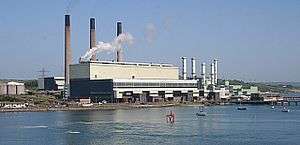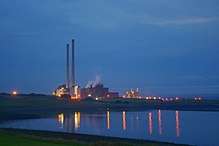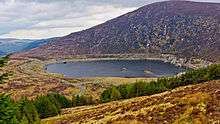Electricity sector in Ireland
The electricity sectors of the Republic of Ireland and Northern Ireland are integrated and supply 2.5 million customers from a combination of coal, peat, natural gas, wind and hydropower.
The grid runs as a synchronous electrical grid and in terms of interconnections has undersea DC-only connection to the UK National Grid, alongside plans in the advanced stage for a higher power, planned Celtic Interconnector to France.
Island system
The electricity sector in Ireland previously operated as two separate markets: Northern Ireland operated as part of the UK, and the Republic of Ireland operated its own separate market. On 1 November 2007 the two Transmission System Operators (System Operator Northern Ireland and EirGrid) established the Single Electricity Market (SEM) for the island of Ireland. The SEM has created "a gross mandatory pool market, into which all electricity generated on or imported onto the island of Ireland must be sold, and from which all wholesale electricity for consumption on or export from the island of Ireland must be purchased".[1] According to the Electricity Association of Ireland, in 2013 the Single Electricity Market had approximately 2.5 million customers; 1.8 million in the Republic and 0.7 million in Northern Ireland.[2] The effect of Brexit on the SEM has yet to be defined.
Ireland and Northern Ireland form a regional group of the Europe-wide ENTSO-E organisation. The networks are not yet interconnected with the Continental Europe grid, but have interconnection with the British network through the Moyle Interconnector and the East–West Interconnector. In 2014, the island had an electricity interconnection level (international transmission capacity relative to production capacity) of 9%, below the recommended 10% level.[3]
Electricity in the Republic of Ireland
Electricity generators in the Republic of Ireland are ESB, Airtricity, Synergen (70% ESB), Edenderry Power, Endesa-Ireland and Huntstown (Viridian). ESB owns the transmission and distribution networks.
The Transmission System Operator (TSO) is EirGrid plc, which assumed the role from ESB Networks on 1 July 2006. EirGrid ensures the safe, secure and economic operation of the high voltage electricity grid. EirGrid is owned by the Irish State and is established as a result of a government decision to create an independent organisation to carry out the TSO function, in order to assist the liberalisation of Ireland's electricity industry and the development of a competitive market.
The electricity industry is regulated by the Commission for Regulation of Utilities (CRU) which also regulates the natural gas market. The functions and duties of the CRU have been altered and expanded significantly by legislation transposing EU directives into Irish law.
Electricity in Northern Ireland

There are three power stations in the province: Ballylumford power station, Coolkeeragh power station and Kilroot power station. Northern Ireland Electricity (a subsidiary of ESB Group) owns the transmission and distribution networks.
The Single Electricity Market means that Northern Ireland Electricity carries electricity on its network in exchange for a regulated charge to the electricity supply company. As of September 2011 domestic customers in Northern Ireland are able to buy electricity from Electric Ireland, Power NI, Airtricity, Click Energy or Budget Energy. Industrial and commercial customers are able to choose from several other electricity suppliers.
The Transmission System Operator (TSO) is System Operator Northern Ireland (SONI Ltd). SONI ensures the safe, secure and economic operation of the high voltage electricity grid in Northern Ireland. SONI's counterpart in the Republic of Ireland is EirGrid. Both of these are owned by EirGrid plc which also (through a partnership of SONI and EirGrid) acts as the Single Energy Market Operator (SEMO), i.e. runs the new all-island wholesale market for electricity.[4]
Electricity Regulation
The electricity industry in Northern Ireland is regulated by the Northern Ireland Authority for Utility Regulation (NIAUR).[5] The Authority is an independent public body established to oversee and regulate the electricity, gas, water and sewerage industries in Northern Ireland. The Authority is a non-ministerial government department responsible for promoting the short and long term interests of consumers. It does not make policy, but ensures that the energy and water utility industries are regulated and developed within ministerial policies. It is governed by a Board of Directors and is accountable to the Northern Ireland Assembly.[5]
History
The Office of Director General of Electricity Supply for Northern Ireland was established in 1992 in association with the privatisation of electricity supplies in Northern Ireland.[6] The Director General was appointed by the Department of Economic Development to regulate the electricity industry.[7] Statutory duties included ensuring that all reasonable demands for electricity were satisfied; that licence holders were able to finance their activities; to promote competition in the generation and supply of electricity; to protect the interests of consumers of electricity in terms of price and continuity of supply; to promote efficiency and economy; to promote research and development; to protect the public from danger; and to secure the health and safety of persons employed in the generation, transmission or supply of electricity.[8]
The regulatory system was reformed in 2003 to combine the regulation of electricity and natural gas into a single energy regulator. The Northern Ireland Authority for Energy Regulation was established and the offices of Director General of Gas for Northern Ireland and Director General of Electricity Supply for Northern Ireland were abolished.[9] The posts of Chief Executive and Chair of the Energy Regulator were split in 2006.
In April 2007 the regulatory system for utilities was further reformed to encompass the water supply and sewage industries.[10] The Northern Ireland Authority for Energy Regulation became the Northern Ireland Authority for Utility Regulation. The Board of Directors is responsible for the overall strategic direction of the organisation. The Board comprises a non-executive Chairman, four non-executive members and the Chief Executive. The key functional areas in the organisation are Network Operations, Wholesale, Retail and Consumer Protection, and Corporate Affairs.[11]
Key people
Director General of Electricity Supply
- Geoffrey Horton, 1992–1995[12]
- Douglas Bowman McIldoon (b. 1945), 1995–2003. Was also Director General of Gas Supply.
Chair and Chief Executive of Energy Regulation
- Douglas Bowman McIldoon, 2003–June 2006.[13]
Chief Executive of Energy Regulation
- Iain Osborne, June 2006–2007[13]
Chief Executive of Northern Ireland Authority for Utility Regulation
- Iain Osborne, 2007–December 2010
- Shane Lynch, January 2011–October 2013[14]
- Jenny Pyper, October 2013–Autumn 2020[15]
Chair of Northern Ireland Authority for Utility Regulation
See also
References
- http://www.allislandproject.org/en/SEM_overview.aspx
- EAI, Electricity Association of Ireland. "The Single Electricity Market". Archived from the original on 18 May 2013. Retrieved 22 May 2013.
- COM/2015/082 final: "Achieving the 10% electricity interconnection target" Text PDF page 2-5. European Commission, 25 February 2015. Archive Mirror
- http://www.allislandproject.org/
- "Utility Regulator". Utility Regulator. Retrieved 6 April 2020.
- "The Electricity (Northern Ireland) Order 1992". legislation.gov.uk. 1992. Retrieved 6 April 2020.
- The Electricity (Northern Ireland) Order 1992, Article 5
- The Electricity (Northern Ireland) Order 1992 Article 4
- "The Energy (Northern Ireland) Order 2003". legislation.gov.uk. 2003. Retrieved 6 April 2020.
- "The Water and Sewerage Services (Northern Ireland) Order 2006". legislation.gov.uk. 2006. Retrieved 6 April 2020.
- "Corporate Strategy" (PDF). www.uregni.gov.uk. 2019. Retrieved 6 April 2020.
- "Appointments p.16". The Times. 22 January 1992.
- "The Northern Ireland Authority for Energy Regulation (NIAER) appoints new Chief Executive". The Northern Ireland Authority for Energy Regulation. 3 April 2006. Retrieved 6 April 2020.
- "Utility Regulator announces appointment of new Chief Executive". www.uregni.gov.uk. 8 December 2010. Retrieved 6 April 2020.
- "Utility Regulator announces appointment of new chief executive". www.uregni.gov.uk. 4 July 2013. Retrieved 6 April 2020.
- "Jenny Pyper to retire as Utility Regulator Chief Executive". www.uregni.gov.uk. 19 February 2020. Retrieved 6 April 2020.
- "Bill Emery". www.uregni.gov.uk. Retrieved 6 April 2020.
External links
- EAI: Electricity Association of Ireland
- Single Electricity Market Operator for the Island of Ireland
- Island of Ireland Electricity Regulation
- Commission for Energy Regulation
- Northern Ireland Authority for Energy Regulation
- Republic of Ireland Transmission Network Operator
- System Operator for Northern Ireland (SONI)
- Republic of Ireland Electricity Suppliers
- Northern Ireland Electricity Suppliers
- Transmission map

